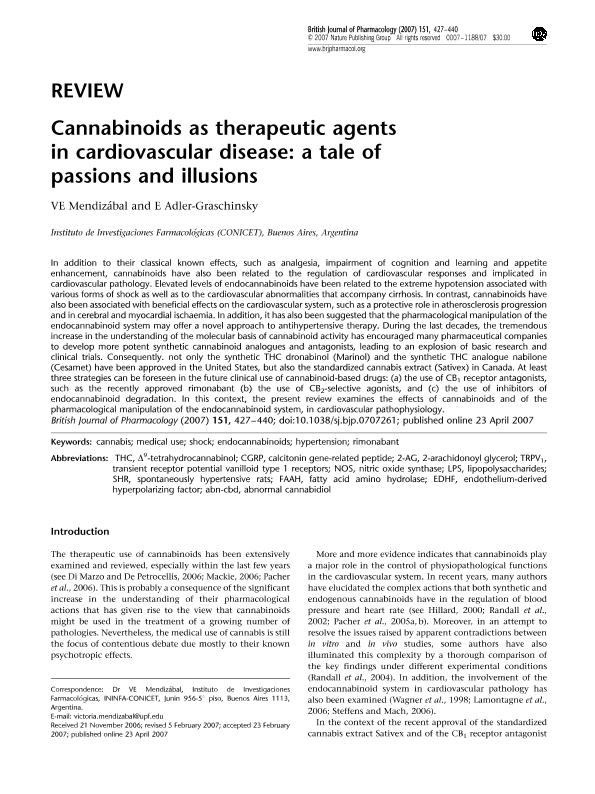Artículo
Cannabinoids as therapeutic agents in cardiovascular disease: A tale of passions and illusions
Fecha de publicación:
06/2007
Editorial:
Wiley Blackwell Publishing, Inc
Revista:
British Journal of Pharmacology
ISSN:
0007-1188
Idioma:
Inglés
Tipo de recurso:
Artículo publicado
Clasificación temática:
Resumen
In addition to their classical known effects, such as analgesia, impairment of cognition and learning and appetite enhancement, cannabinoids have also been related to the regulation of cardiovascular responses and implicated in cardiovascular pathology. Elevated levels of endocannabinoids have been related to the extreme hypotension associated with various forms of shock as well as to the cardiovascular abnormalities that accompany cirrhosis. In contrast, cannabinoids have also been associated with beneficial effects on the cardiovascular system, such as a protective role in atherosclerosis progression and in cerebral and myocardial ischaemia. In addition, it has also been suggested that the pharmacological manipulation of the endocannabinoid system may offer a novel approach to antihypertensive therapy. During the last decades, the tremendous increase in the understanding of the molecular basis of cannabinoid activity has encouraged many pharmaceutical companies to develop more potent synthetic cannabinoid analogues and antagonists, leading to an explosion of basic research and clinical trials. Consequently. not only the synthetic THC dronabinol (Marinol) and the synthetic THC analogue nabilone (Cesamet) have been approved in the United States, but also the standardized cannabis extract (Sativex) in Canada. At least three strategies can be foreseen in the future clinical use of cannabinoid-based drugs: (a) the use of CB 1 receptor antagonists, such as the recently approved rimonabant (b) the use of CB 2-selective agonists, and (c) the use of inhibitors of endocannabinoid degradation. In this context, the present review examines the effects of cannabinoids and of the pharmacological manipulation of the endocannabinoid system, in cardiovascular pathophysiology.
Palabras clave:
CANNABIS
,
ENDOCANNABINOIDS
,
HYPERTENSION
,
MEDICAL USE
,
RIMONABANT
,
SHOCK
Archivos asociados
Licencia
Identificadores
Colecciones
Articulos(ININFA)
Articulos de INST.DE INVEST.FARMACOLOGICAS (I)
Articulos de INST.DE INVEST.FARMACOLOGICAS (I)
Citación
Mendizabal, Victoria Eugenia; Adler, Edda; Cannabinoids as therapeutic agents in cardiovascular disease: A tale of passions and illusions; Wiley Blackwell Publishing, Inc; British Journal of Pharmacology; 151; 4; 6-2007; 427-440
Compartir
Altmétricas




